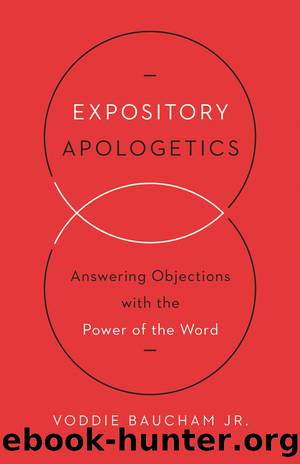Expository Apologetics by Voddie Baucham Jr

Author:Voddie Baucham, Jr.
Language: eng
Format: epub
Publisher: Crossway
THE TEN COMMANDMENTS AND EXPOSITORY APOLOGETICS
I will never forget the first time I heard someone teach Christian ethics from the Decalogue. The teacher was John Frame from Reformed Theological Seminary. I found his lectures on iTunes and began to listen to them on my morning walks. I was blown away! I did not grow up in a Christian home. In fact, I didn’t hear the gospel and come to faith until I was in college. I was not introduced to Reformed theology until after graduating from seminary. Up to that point, I had been educated in an environment of vaguely Arminian, vaguely dispensational, pragmatic-utilitarian, anti-Calvinistic, quasifundamentalism. My journey to Reformed theology took place mainly in the form of reading new books by men like John Piper, D. A. Carson, Alistair Begg, and others, who kept referring to dusty old books. It was in the dusty old books that I discovered the roots of this robust, intensely theological, Christ-exalting, soul-stirring . . . stuff.
Then I discovered RTS online. I began to go back through courses that I had already taken and passed, but had not understood from a Reformed context. It was like learning to walk again; it was glorious, exhilarating, and painful all at the same time. Then I discovered Frame’s lectures on Christian ethics, and pieces began to fall into place. Suddenly, I saw what had been missing: confessionalism and the law. Sure, in my journey to Reformed doctrine, I had discovered both. I was a committed Reformed Baptist, holding to the Second London Baptist Confession of 1689, and I had abandoned dispensationalism and its view of the law. However, I had not made the connection between those two things and the formation of Christian ethics. I drank in Frame’s lectures like a thirsty man trying to drink from a fire hydrant; the more I drank, the thirstier I got, and the thirstier I got, the more there was to drink.
In his lectures, Frame did not legalistically attempt to use the law and confession as a wooden standard. Instead, he reached into the rich heritage and tradition of the Reformed faith to (1) demonstrate the relevance of the Decalogue to Christian ethics, (2) show how our forefathers had handled these issues and what we can learn from them, and (3) provide a framework for ongoing understanding and application in personal life and pastoral ministry. And as an expository apologist, I found it refreshing, encouraging, and quite appropriate that Frame also taught apologetics.5
Download
This site does not store any files on its server. We only index and link to content provided by other sites. Please contact the content providers to delete copyright contents if any and email us, we'll remove relevant links or contents immediately.
The Lost Art of Listening by Michael P. Nichols(7483)
Why I Am Not A Calvinist by Dr. Peter S. Ruckman(4135)
The Rosicrucians by Christopher McIntosh(3505)
Wicca: a guide for the solitary practitioner by Scott Cunningham(3158)
Signature in the Cell: DNA and the Evidence for Intelligent Design by Stephen C. Meyer(3121)
Real Sex by Lauren F. Winner(3001)
The Holy Spirit by Billy Graham(2935)
To Light a Sacred Flame by Silver RavenWolf(2804)
The End of Faith by Sam Harris(2724)
The Gnostic Gospels by Pagels Elaine(2515)
Waking Up by Sam Harris(2448)
Nine Parts of Desire by Geraldine Brooks(2355)
Jesus by Paul Johnson(2347)
Devil, The by Almond Philip C(2322)
The God delusion by Richard Dawkins(2295)
Heavens on Earth by Michael Shermer(2268)
Kundalini by Gopi Krishna(2171)
Chosen by God by R. C. Sproul(2151)
The Nature of Consciousness by Rupert Spira(2085)
